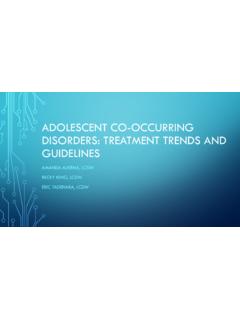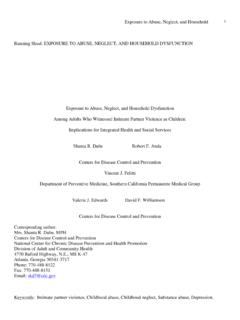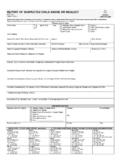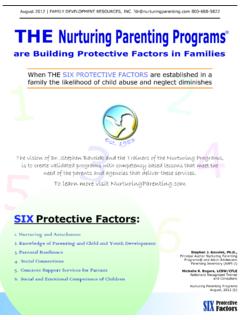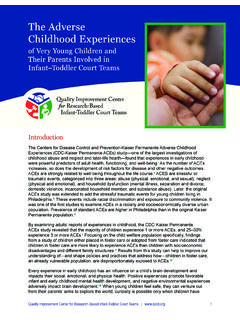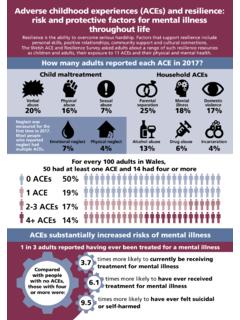Transcription of Using the Adverse Childhood Experiences Scale …
1 Using the Adverse Childhood Experiences Scale ( aces )Misty McIntyre Goodsell, LCSWO dyssey House of UtahObjectives Background of aces Study aces Questionnaire aces Outcomes Implementing in practice MacroACES Background Collaboration between Kaiser Permanente s Department of Preventive Medicine in San Diego and the Center for Disease Control and Prevention (CDC) Dr. Vincent Felitti& Dr. Robert F. AndaACES Background 10 year study 17,000 participants Correlated aces score to health and behaviors occurring over participants lifespans Largest study of its kindDemographicsGenderMale46%Female54% (Latin/Chicano) than Grad or Your ACE Score aces AssessmentQuestionnaireAdditional questions: Have you ever been a combat soldier? Have you ever lived in a war zone? Have you ever been physically abused as a child? Have you ever been sexually molested as a child or adolescent?
2 Have you ever been raped? Who in your family has been murdered? Who in your family has had a nervous breakdown? Who in your family has been a suicide? Who in your family has been an alcoholic or drug user?OutcomesNumber of categories (not events) is summedACE ScorePrevalence033%125%215%310%46%5 or more11% 2 out of 3 experienced at least one category of ACE If any one ACE is present, there is an 87% chance at least one other category of ACE is present, and 50% chance of 3 or more Women are 50% more likely than men to have a Score of 5<Prevalence of Adverse Childhood ExperiencesAbuse, by CategoryPrevalence (%)Psychological (by parents)11%Physical (by parents)28%Sexual (anyone)22%Neglect, by CategoryEmotional15%Physical10%Household Dysfunction, by CategoryAlcoholism or drug use in home27%Loss of biological parent <age 1823%Depression or mental illness in home17%Mother treated violently13%Imprisoned household member5% Adverse Childhood Experiences Are CommonOf the 17,000 HMO Members.
3 1 in 4 exposed to 2 categories of aces 1 in 16 was exposed to 4 categories 22% were sexually abused as children 66% of the women experienced abuse, violence or family strife in childhoodAdverse Childhood experience CategoriesAbuse of Child Recurrent Severe Emotional abuse Recurrent Physical abuse Contact Sexual abuseTrauma in Child s Household Environment Substance abuse Parental separation or divorce - Chronically depressed, emotionally disturbed or suicidal householdmember Mother treated violently Imprisoned household member Loss of parent (by death,by suicide, -or byabandonment)Neglect of Child Abandonment Child s basic physical and/oremotional needs unmetImpact of Trauma and Health Risk Behaviors to Ease the PainNeurobiologicEffects of Trauma Disrupted neuro-development Difficulty controlling anger-rage Hallucinations Depression Panic reactions Anxiety Multiple (6+) somatic problems Sleep problems Impaired memory Flashbacks DissociationHealth Risk Behaviors Smoking Severe obesity Physical inactivity Suicide attempts Alcoholism Drug abuse 50+ sex partners Repetition of original trauma Self Injury Eating disorders Perpetrate interpersonal violenceLong-Term Consequences of Unaddressed Trauma ( aces )
4 Disease and Disability Ischemic heart disease Cancer Chronic lung disease Chronic emphysema Asthma Liver disease Skeletal fractures Poor self rated health Sexually transmitted disease HIV/AIDSS erious Social Problems Homelessness Prostitution Delinquency, violence, criminal behavior Inability to sustain employment Re-victimization: rape, DV Compromised ability to parent Intergenerational transmission of abuse Long-term use of health,behavioral health, correctional,and social servicesACEs BackgroundThe higher the ACE score, the greater the likelihood of: Severe and persistent emotional problems Health risk behaviors Serious social problems Adult disease and disability High health and mental health care costs Poor life expectancyACES Background Big Finding: Childhood Experiences are POWERFUL determinants of adult health outcomesThe following information and slides are being used with permission from three sources: 2003 Presentation of the Child Trauma Treatment Network of the Intermountain West, by Vincent Felitti, MD of Ann Jennings, of The Anna Anda(2010).
5 The relationship of Adverse Childhood Experiences to adult medical disease, psychiatric disorders and sexual behavior: implications for healthcare. In Ruth Lanius, Eric Vermetten& Clare Pain (Eds.), The Impact of Early Life Trauma on Health and Disease: 77-87. Massachusettes: Cambridge University Press. Emotional ProblemsChildhood Experiences Underlie Chronic Depression0102030405060708002 >=4% With a Lifetime History of DepressionACE ScoreWomenMenChildhood Experiences Underlie Attempting SuicideACE ScoreACE Score and Hallucinations0246810120123456>=7 NoYesEver Hallucinated* (%)AbusedAlcohol or DrugsACE Score and Impaired Childhood Memory05101520253035400123>=4 Percentage With Memory Impairment (%)Social IssuesACE vs. Smoking as an Adult0246810121416182002 4-5 ACE ScoreACE vsAdult Alcoholism024681012141618% Alcoholic01234 or moreACE ScoreACE vsIV Drug Have Injected DrugsACE ScoreChildhood experience Underlie Rape05101520253035% Reporting RapeACE ScoreACE and Likelihood of >50 Sexual Partners01234 Adjusted Odds Ratio01234 or moreACE ScoreSexual Abuse of Male Children and Their Likelihood of Impregnating a Teenage Girl05101520253035 Percentage Who Impregnate A Teenage GirlNot Abused16-18 Years11-15 Years<=10 YearsAge When First AbusedHealth OutcomesACE vs.
6 History of Odds Ratio01234 or moreACE ScoreACEs vs. of aces on Mortality0102030405060024 Percent in Age GroupACE Score19-3435-4950-64>=65 What changes were seen? 35% reduction in doctor office visits was found in the year following the assessment (compared to the year before) 11% decrease in ER visits 3% reduction in hospitalizations These changes returned to baseline after two years when medial staff returned to previous medical model without asking about aces or including treatment for the identified traumaFelitti& Anda, 2010 Power of the ACE StudySimplicityThe Data Tell A Simple Story aces are common aces are highly interrelated aces pile up and have a cumulative impact aces account for a large percentage of health and social problems Biologic PlausabilityWhat presents as the PROBLEM may in fact be an attempted solutionAssessment aces is an assessment tool 24 Hour Hotline Your ACE score never changes How do we track progress?
7 BDI, BAI, OQ, YOQ, Suicide Assessments, PCL-C Resiliency: Empowerment Scale , Youth Self-Efficacy ScaleApproach Use a Trauma Lens Shifting from What is wrong with this person?to What has this person been through? Routinely seek a history of Adverse Childhood Experiences from ALL patients Acknowledge their reality by asking, How has this affected you later in life? TransparencyIntergenerational Impact Children of Parents with ACE scores are secondary victims Historical Trauma Parents with ACE scores will often lack coping and resilience that fosters effective parenting What does this mean for the extended family of our patients?Therapy There is no SINGLE recommended approach Trauma Based Therapies: Trauma Based CBT EMDR DBT EFT (Tapping) Mindfulness Mindfulness CBT (MCBT) Family TherapyTherapy Depression Psycho-Education DBT Skills, Communication, Stress Management Whole-Person Approach ReferralsConsiderations Baby Boomers and Older Persons are a population that didn t access or talk about mental health (cultural norm)
8 Cultural norms Language BarriersStrength BuildingMicro Recommendations Implementation Private Practice Health Facilities Senior Living Corrections Education System Make Personal Connections to MDs and Nurses Connect Children to Resiliency Activities Mind-Body ConnectionsMacro Recommendations aces becoming a primary assessment tool in mental and physical health agencies and organization Encourage clinical research on trauma and its treatment Providing funding to treat trauma should become a priority for Insurance, business, government etc. Good for individuals, families and communities High Economic Impact Whitfield, 1998 Macro Recommendations Effective parenting programs Parenting education starting as part of K-12 Education Recognition of aces /trauma and appropriate treatment should be a mandatory component of education for all health professionals Create and Endorse Primary Prevention EffortsWhitfield, 1998 Local Resources Trauma Informed Care Network UCASA 40 Hour Training Utah Domestic Violence Council Utah Department of Health BRFSS StudyNational Resources aces Connection Online Community of Researchers, Clinicians and Policy Makers The Anna Institute ACE Response aces Too High , ButchartA, FelittiVJ, Brown DW.
9 (2010). Building a Framework for Global Surveillance of the Public Health: Implications of Adverse Childhood Experiences . Preventive Medicine, 39 (1): Anda(2010). The relationship of Adverse Childhood Experiences to adult medical disease, psychiatric disorders and sexual behavior: implications for healthcare. In Ruth Lanius, Eric Vermetten& Clare Pain (Eds.), The Impact of Early Life Trauma on Health and Disease: 77-87. Massachusettes: Cambridge University Press. Whitfield CL. (1998). Adverse Childhood Experiences and Trauma (editorial). American Journal of Preventive Medicine,14:361 363.

